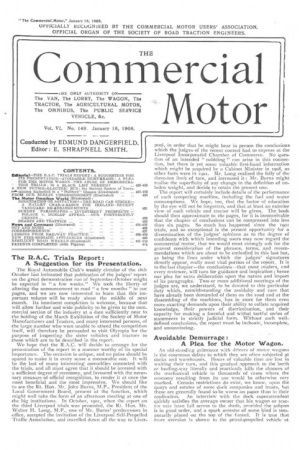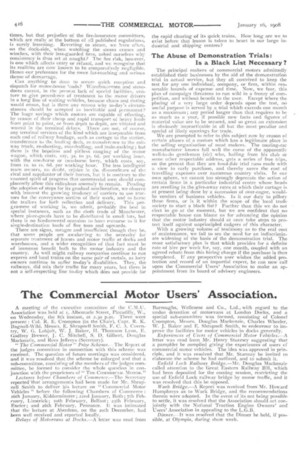The R.A.C. Trials Report: A Suggestion for its Presentation..
Page 1

Page 2

If you've noticed an error in this article please click here to report it so we can fix it.
The Royal Automobile Club's weekly circular of the iSth October last intimated that publication of the judges' report on the great demonstration run of September-October might be expected in "a few weeks." We took the liberty of ' altering the announcement to read " a few months" in our pages, and we are now interested to learn that this important volume will be ready about the middle of next month. Its imminent completion is welcome, because that will allow further and wide publicity to be given to the commercial section of the industry at a date sufficiently near to the holding of the March Exhibition of the Society of Motor Manufacturers and Traders, and many interested persons, of the large number who were unable to attend the competition itself, will therefore be persuaded to visit Olympia for the purpose of inspecting the sister vehicles and tractors to those which are to be described in the report.
We hope that the R.A.C. will decide to arrange for the presentation of the report in a manner worthy of its special Importance. The occasion is unique, and no pains should be spared to make it in every sense a memorable one. It will he the last of many interesting assemblies connected with -the trials, and all must agree that it should be invested with a sufficient degree of ceremony, and favoured with the necessary measure of official recognition, to render it at once the most beneficial and the most impressive. We should like -to see the Rt. Hon. Mr. John Burns, M.P., President of the Local Government Board, present at the function, which might well take the form of an afternoon meeting at one of the big institutions. In October, 1901, when the report on the third Liverpool trials was presented, the Rt. Hon. Mr. Walter H. Long, M.P., one of Mr. Burns' predecessiors in -office, accepted the invitation of the Liverpool Self-Propelled 'Traffic Association, and travelled down all the way to Liver
pool, in order that he might hear in person the conclusions which the judges of the recent contest had to express at the Liverpool Incorporated Chamber of Commerce. No question of an intended " nobbling " can arise in this connection, but there is yet some valuable first-hand information which might be acquired by a Cabinet Minister in 1908, as other facts were in two Mr. Long realised the folly of the three-ton (link of tare, and increased it : Mr. Burns might realise the superfluity of any change in the definition of unladen weight, and decide to retain the present one.
The report will certainly include details of the performance of each competing machine, including the fuel and water consumptions. We hope, too, that the factor of education by the eye will not be forgotten, and that at least an exterior view of each vehicle and tractor will be given. The book should then approximate to too pages, for it is incottceivable that the chapter of conclusions can be compressed into less than six pages. So much has happened since the 1901 trials, and so exceptional is the present opportunity for a dissemination of the judges' opinions as to the degree of confidence with which intending users may now regard the commercial Motor, that We would most strongly ask for the gravest consideration of the phrases, terms; and recommendations which are about to be embodied in this last but, as being the lines under which the judges' signatures directly appear, really most vital portion of the report. It is to the last chapter—the conclusions—that most readers, and every reviewer, will turn for guidance and inspiration ; hence our plea for extra deliberation upon the nature and import of its paragraphs. Two or more additional meetings of the judges are, we understand, to be devoted to this particular duty which, notwithstanding the assiduity and care that have already been demanded of them on the road and at the dissembling of the machines, has in store for them even more exacting demands upon their ability to collate acquired knowledge, their powers of discrimination, and their capacity for making a forceful and withal tactful series of statements in• strictly judicial form. Without such welldefined conclusions, the report must be inchoate, incomplete, and unconvincing.
Avoidable Demurrage: A Plea for the Motor Wagon.
An old-standing grievance with drivers of motor \vag-ons is the enormous delays to which they are often subjected1-cit docks and warehouses. Hours of valuable time are lost in waiting their turn, and this gradual approach to the berth or loading-way literally and practically kills the chances of the mechanical vehicle in thousands of eases where the economy resulting from its use would be otherwise very marked. Certain restrictions do exist, we know, upon the quays and estates of some dock companies and trusts, but these are generally found to be worse on paper than in their application. An interview with the dock superintendent quickly satisfies the average owner that his wagon or tractor may have full access to the sheds, provided the ashpan is in good order, and a spark arrester of some kind is temporarily placed on the top of the funnel, It is true that more aversion is shown to the petrol-propelled vehicle at
times, but that prejudice of the fire-insurance committees, which are really at the bottom of all published regulations, is surely lessening. Reverting to steam, we have often, on the dock-side, when watching the steam cranes and winches, with their less-guarded fires, asked ourselves why consistency is thus set at naught? The fire risk, however, is one wilier' .affects entry or refusal, and we recognise that its realities are now known to be comparatively negligible. Hence our preference for the more far-reaching, and serious theme of demurrage.
Can anything be done to secure quick reception and dispatch for motor-borne loads? I,Varehoueemen and stevedores cannot, in the present lack of special facilities, venture to give precedence of treatment to the motor drivers in a long line of waiting vehicles, because chaos and rioting would ensue, but is there any reason why to-dav's circumstances should be accepted is inevitable and permanent? The huge savings which motors are capable of effecting, by reason of their cheap and rapid transport of heavy leads Ii om point to point, or from depot to depet, are vitiated and wasted in the terminal delays: There are not, of course, any terminal services of the kind which are inseparable from each end of railway haulage, such as cartage to the sta.tion, transference le th" loading deck, re-transference to the railway truck, re-sheeting, marshalling, and train-making, ; but there is the hopeless and pitiless ranging of the motor wagon, which costs, say, 3s. to 3s, 6d. per working i101.11", with the one-horse or two-horse lorry, which costs, say, from is. to is. 6d. per working hour. The lessintelligent team owners, no doubt, rejoice in the discomfiture of the rival and supplanter o.f their horses, hut ii is contrary to the vaunted spirit of progress that commercial men should complacently allow this ridiculous anomaly to remain. Pending the adoption of steps for its gradual amelioration, we observe with interest the growing tendency of carriers to use tractors for the conveyance section of their work, and to horse the trailers for both collection and delivery. This programme of working is, we admit, probably the best in special instances, such as the cloth trade of Manchester, where piece-goods have to be distributed in small lots, but there is no fundamental occasion Io have recourse to it for single-destination loads of five tens and upwards. There are signs, meagre ;mil insufficient though they be, that some people are awakering, to the necessity for separate treatment of horses and motor traffic at decks and warehouses, and a wider recognition of that fact must be of immense benefit both to the motor industry a.nd the country. As well might railway companies continue to run express and local trains on the same pair of metals, as lorry -owners continue to suffer to-day's disabilities. They, the railways, did mix their traffic for many years, but there is atot a self-respecting line to-day which does not provide for
the rapid clearing of its quick trains. How long are we to exist before that lesson is taken to heart in our large industrial and shipping centres?
The Abuse of Demonstration Trials: Is a Black List Necessary ?
The principal makers of commercial motors admittedly established their businesses by the aid of the demonstration trial in actual service, but they all contrived to keep the test for any one individual, company, or firm, within rea-, sonable bounds of expense and time. Now, we fear, this plan of campaign threatens to run wild in a frenzy of competition, and without benefit to the user. Except where the placing of a very large order depends upon the test, no useful purpose is served by a trial which exceeds one month as a maximum; any period longer than that requires to be as much as a year, if possible new facts and figures of material value are to be secured, and so great an extension is obviously impracticable in all but the most peculiar and special of Likely openings for trade.
We are prompted to nefe,r to this subject now by reason of certain abuses of a custom which has a legitimate place in the selling organisation of most makers. The touring-car manufacturer knows full well the curse of the apparently well-to-do gentleman (sic), who, hailing from his club or some other respectable address, gets a series of free trips, On the pretext that they are bond-fide trial runs made with a view to early purchase, and thereby saves the cost of travelling expenses over numerous country visits. In our own sphere, we cannot too strongly deprecate the action of certain firms in a particular industrial centre whose heads are revelling in the give-away rates at which their cartage is at present being done by a succession of over-eager, wouldbe vendors of business vehicles. Is it our duty to pillory these firms, or is it within the scope of the local trade society to start a black list? Further than this we do not elect to go at the moment, but we are confident that no respectable house can blame us for •advancing the opinion that the motor industry should at once take steps to protect itself against unprincipled cadgers of this character.
With a growing volume of testimony as to the Teal cost of maintenance, we fail to see the need fur an indiscriminate widening of the basis of the demonstration trial. The most satisfactory plan is that which provides for a definite rate of hire per week for, say, one month, coupled with an agreed rebate from this hiring charge if the purchase is then completed. If any prospective user wishes the added protection and record of an impartial expert, he can now call upon the Commercial Users' Association to make an appointment from its board of advisory engineers.




















